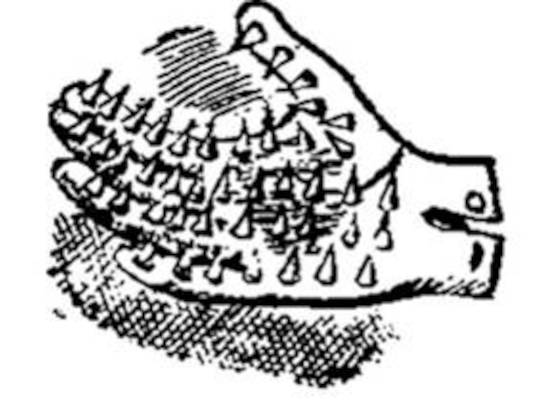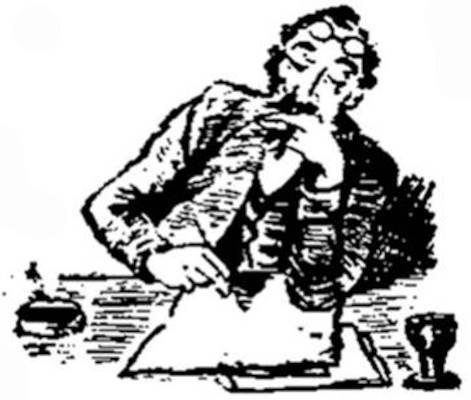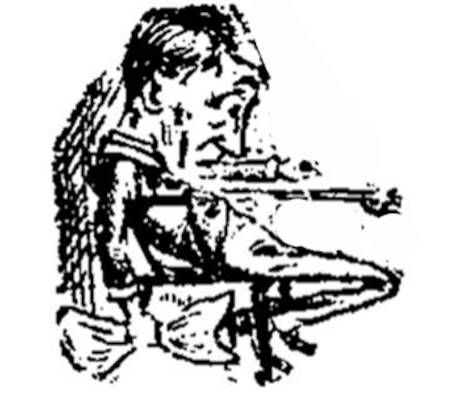This article has been transcribed from a copy of the Cardiff Times in the online collection of scanned Welsh newspapers 1804-1919 in the National Library of Wales, with grateful recognition of the free access accorded to all readers. Paragraph breaks have been introduced for easier reading.
James Berry (1852–1913) was hangman from 1884-1892, and came from the West Riding of Yorkshire. Armley Prison in Leeds was opened in 1842, and was the location for West-Riding executions. Roundhay Park in Leeds is one of a large number of Yorkshire references in ‘Samuel’s Sentiments’ in these years. William Gladstone was Liberal Party leader and Prime Minister 1868-74, 1880-85, 1886, and 1892-94; which of the many men of named William Bacon is intended is not known; Mrs Langtry: Emilie Charlotte Langtry (née Le Breton; 1853 – 1929), known as Lillie (or Lily) Langtry, was a celebrated socialite, actres,s and producer, best remembered as mistress of the Prince of Wales (later Edward VII) from 1877-1880. The Princely House of Thurn and Taxis was a key player in the development of European postal services. In chapter 5 of the Acts of the Apostles, Ananias drops dead after lying to St Peter.
My eye and Peggy Martin (more frequently ‘all my eye and Betty Martin’) is an eighteenth-century expression of disbelief, still current throughout the twentieth century. Knur and spell was a distinctly unaristocratic game. The Oxford English Dictionary quotes the Daily Telegraph of 14th January 1872 as follows: Knur and spell is simply a formalisation of something that every male person in the world must have done at some time throwing a ball or stone in the air and giving it a tremendous clout with a stick. … The Spell is the device that throws the ball (the Knur) into the air. It is an iron contraption that lies on the ground looking a bit like a rat trap; the framework holds a flat horizontal spring, held down by a catch. On the releasable end of the spring is a little cup containing the knur, a tiny white ball (porcelain, of all things), one inch across and weighing half an ounce. You stand about four feet away from the spell, armed with a ‘stick’, rather like a billiard cue with a hammer head (called the ‘pommel’). You tap the catch on the spell, the knur jumps up about four feet; the object is to hit it farther, over a fixed number of goes, than anyone else. The saying ‘my eye and Peggy Martin’ (more frequently ‘all my eye and Betty Martin’) is an eighteenth-century expression of disbelief, still current throughout the twentieth century. —David Skilton

RADUCERS, of whom I have many, may not think it, sir, but when I am not engaged in those mighty literary labours which so enchain the attention of a gasping world, time somehow has a habit of hanging heavily on I my hands. I use the term about time hanging, &c., for convenience, though I may tell you that I don’t like it; it is so suggestive of one of Berry’s eight o'clock matinée entertainments at Armley or elsewhere. My literary labours (I call them ‘labours’ advisedly, for I am not one of those men who ‘throw off’ literary articles; I throw off my clothes, and I have thrown off the measles, but I don't throw off articles by any means) still leave me with a certain amount or leisure, sir, and the question is, how am I to fil, this up? Some men fill up their time by filling up themselves – with strong waters, but this course is not open to me, for I have discovered of late years that I am possessed of an organ called a liver, an organ that will not bear playing upon.
I have a leaning for amusements more or less intellectual when I go in for that sort of thing, and on this account I should beguile my leisure by playing skittles, but I don't know of any skittle alley about here. Kour and spell, too, is an aristocratic game possessing many fascinations (it casts a sort of ‘spell’ upon one, don't you see?) that might enthral me, but then it is beyond my means; it brings me into such high-class company that I really dare not think of indulging in it. Darts is another patrician game, and I daresay that I should play at it all day if I were out of work – and didn't want any – but as it is I dare not trust myself to its engrossing charms, which are of such a nature that I have known a man play at it for a week at a stretch, the while his wife and family were waiting ‘grubless’ (may I be permitted this expression?) at home. I have given up angling in despair. I use the term angling instead of the word ‘fishing,’ because, so far as I have been concerned, fish have never by any chance entered into the transaction at alI. I have spent quite a small fortune in the laudable attempt of proving that there positively are fish in the lake at Roundhay Park, but sorry am I to record the fact that I never caught anything there but a bad cold, and that the only bites I have ever had have been those provided by my own luncheon. There is too much work about cricket for me to ‘play’ (save the mark) at it, and I have no ambition to be made the sport of a vulgar mob on a Saturday afternoon as I walk from the wickets with a fully developed ‘duck egg’ to my score. I have no ambition to bear such aggravating yells as ‘butter fingers’ and ‘run after it, Jumbo,’ as I stand in the field. I have tried gardening, sir, and gardening has most considerably tried me, but I'll tell you all about that ‘at after,’ as some people say.

Three gentlemen who are endeavouring to collect their scattered thoughts.
I was talking about this very subject to my friend Kneeshaw the other day, and he expressed his private and personal opinion that true happiness in one's leisure consisted in lying on one's back smoking, and that no man need wish for anything more to fill up the void of time. ‘But,’ said he, adding a sort of rider, ‘why don't you go in for collecting something, Samuel?’ Collecting something, indeed; why, haven't I the finest collection of unpaid bills, notices from the municipal authorities touching sundry rates, and invitations from her Gracious Majesty (summonses), of any man in Cardiff? Rather! Talk about collections; you should see my tombst– [‘tombstone’, or pawnticket] – but there, I’ll say no more on that head, as the phrenological lecturer observed. Talk about me turning collector, why there is something uncanny – something that I don’t like about the very word[.] It suggests to my mind a dingy man with a black book, a cheap bottle of ink slung from one of the buttons of his waistcoat, and a very sharp pointed pen stuck behind his right ear – a man who plants his boot between the door and the jamb, and refuses to be denied by the servant girl. Collector, yes, I am a fine collector, I am.
If you saw my furniture, my dear sir, you would imagine that I had been collecting antiques and venerable ruins in that line for years. I have more ricketty chairs, two-legged stools, veneerless sideboards and decrepit ‘looking glasses’ than most men – my domicile, sir, is a perfect infirmary for damaged furniture, and all this the consequence of the numerous affrays and feuds existing between the various male members of my very considerable family. Collections, indeed! What should I collect if I did go in for that sort of thing as a hobby? Let me collect my scattered thoughts – a by no means easy process – first. Let's see, I might collect coins. H’m, I've been trying to do that for years – current ones – but somehow my collection has got a good deal scattered. And what if I collected the antique sort? I should be cheated, I'll be bound. It is astonishing what a lot of rare old Roman coins are manufactured every day at Birmingham and supplied to dealers at so much per dozen. I never met a man yet in a respectable position of life who had not a specimen of early coinage put away somewhere – a specimen with an unblemished record, according to the owner thereof. And is it not just the same with relics? There are enough pieces of the True Cross in existence to furnish a large wood yard, and as for Waterloo relics, why, Birmingham annually sends them to the peasants who live in the vicinity of the field of battle by the ton, and they are in due course supplied to credulous tourists. Relics are a swindle, sir, and the man who prides himself upon having a few hairs from Mahomet's whiskers, King Alfred's warming pan, Julius Caesar's trouser buttons, or the toothpick of Mary Queen of Scots is an unmitigated ass, or a fearful Ananias, and ought to be stuffed and sold as a mummy.

The glove of ‘Peter the Cruel’ –one with which he used to shake hands with his most particular ‘friends.’
Just glance for a moment at the horrid men who go collecting insects, butterflies, moths, beetles and exaggerated fleas – what do you think of them. Uncomfortable men to be near, they are, I can tell you. When their beetles escape from the pill boxes in which they are confined, and you, a visitor, say, feel two of them walking single file down your back, it is no joke, I can tell you. Finding a fine healthy spider crawling up your leg has a simply horrific effect. But the enthusiastic entomologist (a good mouthful, that word, is it not?) recks nothing of these things. He goes grubbing in the earth for chrysalides and courting backache; he goes out at night ‘sugaring’ (a process which consists in spitting out a mouthful of run and treacle and water upon the bushes; I'd rather swallow the mixture) in woods for moths, and comes home to his wife with his clothes full of earwigs, centipedes, and other lively and engaging creatures; he pursues active-minded butterflies on tropical days, and usually barks his shins against an obstruction, or tumbles into a ‘cut,’ a ditch, or a canal in the ardour of his pursuit. I never, sir, despise my species so much as when I see a man of this kind pinnin[g] miserable insects to bits of cork bevelled down at the edges. No insect and grub collecting for me, thank you.

‘Let’s see; which autograph shall I write now – h’m; Alfred the Great’s will do; I’m told that he couldn’t write at all.’
collector of botanical specimens from a herbalist or quack doctor. They both go out looking for mysterious herbs, and they both carry the same sort of suspicious japanned tin box, which, for ought anybody knows to the contrary, contain murdered remains, tough beef sandwiches, or acid drops – ‘two hounce a penny!’ What they do with all the herbage they get hold of I don't know, but possibly they brew nauseous beer from it, or sell it to kill superfluous cats or vermin. Of a different sort, sir, is the stamp collector. When I was a boy there was a sort of idea entertained amongst the juveniles amongst whom I mixed that the acquisition of a million ‘used’ (‘cancelled[‘] is, I suppose, the right word) penny English stamps would procure for the collector the sum of £50 from a generous government. By diligently canvassing all my relations, all the tradesmen with whom my father dealt, and several large firms besides, I, by this time I reached 15 years of age, managed to scrape together about 40,000 such stamps. I then entered into a minute calculation whereby I ascertained that if I went on collecting at the same rate I should become the possessor of the necessary million by the time I reached the rather patriarchal age one hundred and twenty seven. By the time this calculation was completed I discovered, also, that story about the fifty pounds was in my eye and Peggy Martin, whatever that may mean, so I gave up.

‘Misery! Misery! Here someone has gone and bought two hairs out of Mahomet’s beard that I meant having for my collection.
But as to foreign stamps, I first derived my ideas of commerce, sir, by ‘swopping’ foreign stamps with schoolfellows. I believe that one Chilean was held to be equivalent to two stamps of Thurn and Taxis, and that a blank penny English was worth a 48 French Republican, adorned with a very swollen head of the Goddess of Liberty, who appeared to be suffering from that distressing ailment the mumps. I had several three-cornered Cape of Good Hopes, but I exchanged them for a cricket bat with an unmistakable crack in the handle. One enterprising boy in the school, sir (a boy who has since become an opulent restaurant proprietor) used to get sheets of foreign stamps from dealers in order that he might peddle the same among his school fellows. He confided to me that the business, so far as he was concerned, was all clear profit. He got 15 sheets in all from the dealer, and he sold them off at a great reduction. Unfortunately he forgot to remit the amount realised (less commission) to his principal, the dealer, and there was a good deal of hard-bake and mint humbug pervading that boy about that period. He did not file a petition [of bankruptcy], being considerably under age, but he wrote to the dealer telling him that things had gone bad with him, his baby brother having masticated all the 15 sheets one day whilst the nurse wasn’t looking. That any sane man who has arrived at a mature age can pass his time if gumming these bits of used paper in a book is one of those things ‘that no fellow can understand.’ The autograph maniac, sir, is another human specimen of misdirected energy and labour. A literary friend of mine who is much pestered for his autograph not only sends it to all who may apply for it, but he obligingly sends a few more also, these including the signatures of Mr Gladstone, William Bacon, Shakespeare, Lord Shaftesbury, and Mrs Langtry, and all written by himself. He is so fond of writing other people's names that l trust he may never take it into his head to write one on a cheque for a large amount.
If it were not for that peremptory foreman of yours I should have something to say about the men who prowl about with a hammer and chisel (like stone masons out of employment) collecting geological rarities; the men who collect china and get it as cracked as they are themselves; the idiots who go in for creses [crests?] and court brain fever by trying to translate the mottos attached thereto, and the ‘cranks’ who hang about old bookstalls and pocket one or two volumes when the mouldy proprietor isn't looking. But there, no collections for me; no, not even Sunday collections for the shirtless heathen in the desert.
Last modified 22 February 2022